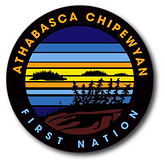July 15, 2014 Edmonton, Alberta – Today the Athabasca Chipewyan First Nation (ACFN) announced they will no longer participate in the TransCanada Grand Rapids Pipeline hearing citing impossible timelines and prejudice within the process. The First Nation is referring to the project as the “Mother of All Pipelines” feeding projects like the Energy East Pipeline and the controversial Keystone XL pipeline projects.
“The AER put us in an impossible position. I am dumbfounded by this process,” stated Adam before he continued to speak about the obstacles the ACFN has faced in trying to get action from both government and industry to adequately address their concerns.
Adam spoke about how TransCanada consistently showed little regard to actually addressing the concerns raised by the ACFN and were more concerned with how much it would cost to “buy us off.”
Adam added, “this new [Alberta Energy Regulator] regulatory process is fundamentally flawed. It is supposed to be the test of the new regulatory regime for oil and gas and pipelines in Alberta. Yet, it has seriously undermined our efforts to address any concerns about First Nations impacts.”
Adam was referring to the lack of assessment or studies done on the impacts to Aboriginal and Treaty Rights, impacts to hunting, fishing and trapping and the incomplete Caribou Protection plan in relation to the project brought up earlier in the day by their legal counsel.
“The Grand Rapids hearings demonstrated how the Alberta government is willing to put the cart before the horse. TransCanada’s application included incomplete studies and reports and yet the AER still granted a fast tracked hearing where TransCanada continued to submit last minute evidence. ACFN was raising concerns that should concern all Albertans – how can you ensure safety and protect the environment if you haven’t even completed the necessary studies,” stated Lorraine Land, ACFN legal Counsel of Olthuis Kleer Townshend LLP.
The ACFN will be exploring other avenues to challenge the proposed pipeline project and Chief Adam closed his remarks with “It is our law that we need to protect the land and the water so that our people will be here for another 9000 years. We must do this as long as the sun shines, the grass grows and the river flows. Today, we respect Dene law and for that reason we can no longer continue in this process.”
For More information please contact:
Eriel Deranger, Communications Coordinator 780-903-6598

